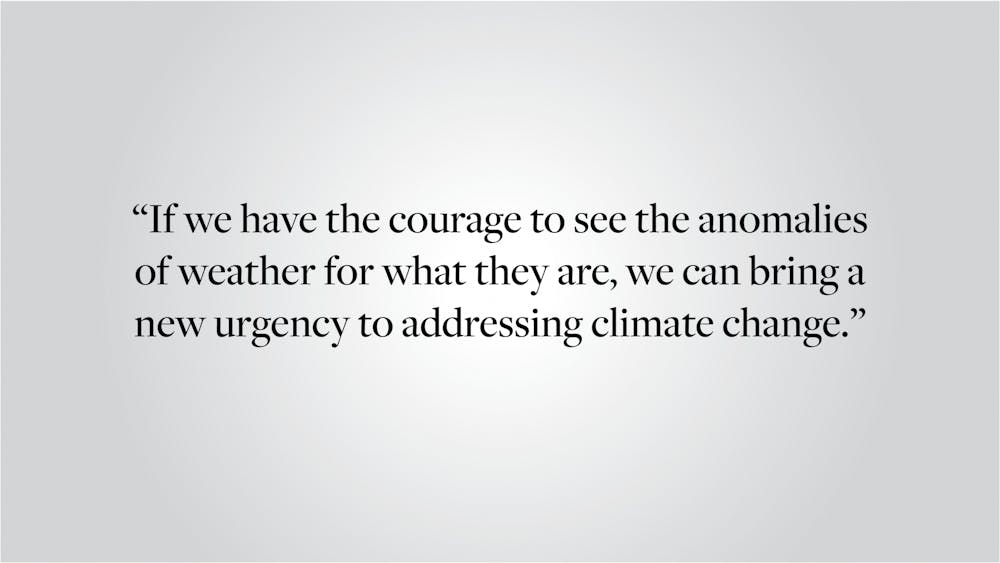Strawberry Switchblade’s song “Trees and Flowers” can lull you into a drowsy, blissful state. The guitar strums with a lazy elegance, the drums and bass follow with hippie simplicity and Rose McDowall sings in an elongated, careful tone. The grace captured in this song's instrumental is that of a sunny spring day, when the last of the snow quietly vanishes and you are invited to walk aimlessly in an easy, numb stride. But when you pay close attention to the lyrics, this pleasant facade quickly deteriorates. The narrator describes isolation, impotence and hopeless angst when facing a seemingly innocuous but dangerous world.
The feelings expressed within this song are not very different from what I felt last Saturday, Feb. 12, when the thermometer read 60 degrees Fahrenheit for most of the day. The weather was pleasantly warm; the snow melted to reveal the grass earlier than anticipated; the breeze offered a complimentary touch. But these pleasant anomalies are actually part of a morbid global trend — climate change. It's not only that climate change will render these anomalies typical, it’s that the warm days compound to reveal the deadly future lying ahead. Like the narrator of “Trees and Flowers,” one can see the nightmarish future in the seemingly mundane present. It is up to us to acknowledge the pleasant for what it is: a glimpse into an impending reality.
The domain of nature and the man-made world mesh into an indistinguishable blur in these days of early climate catastrophe. The institutions which propel climate change have become as prevalent as climate change itself. There is the sense that we cannot hold these companies accountable because of their omnipresent status. Large chemical companies like DuPont have avoided accountability for the pollution they cause, and others like Chevron have yet to pay a cent to affected communities harmed by irresponsible toxic waste dumping processes. Institutions like DuPont and Chevron have asserted themselves as an inevitable presence, holding power that can only be compared to that of a natural force. Fighting a corporation seems just as foolish as fighting the weather. The individual is expected to live under the conditions of climate change and under the power of the institutions that further contribute to ecological collapse.
Acknowledging the reality of climate change is often followed by a feeling of isolation. These anomalous days are proclaimed as a taste of summer rather than as a sign of global warming. Despite the implications of a warm winter day, it is difficult to not enjoy it. Lounge around on the Main Green, go for a run, embrace the joy of wearing shorts for the first time in months — simple pleasures that are impossible to deny. And why not enjoy them? Pouting indoors and having a mental breakdown about climate change does nothing to alter the weather or save the world. It makes sense to go outside, enjoy the weather and embrace ignorant bliss. And because of that, we are all alone in how we grapple with the implications of climate change. No one else appears frightened. The terror inspired by the impending climate catastrophe exists in a different reality from the one in which we enjoy nice weather.
Over our lifetimes, it is nearly impossible to escape the dismal forecasts of climate change. We have all heard at least some warnings of what awaits us: the forecast that sea levels will rise 12 inches in thirty years, the promise of drastically increasing temperatures, the “point of no return” threshold for drastic action rapidly closing in. We now see these grim promises beginning to translate into tangible realities, such as that warm Saturday we experienced last week. While we could choose to react with enjoyment or ignorance, we instead must recognize that we are at the onset of a new phase of climate change. In this phase, any moment or weather condition has the potential to contain horror. It is difficult to distinguish the regularities in weather patterns from the irregularities — is it simply a nice day or is it an omen of global warming? That in itself speaks to the absurd conditions of this moment.
But this juncture also presents new opportunities. The dire promises about climate change have started to materialize. Our proximity to ecological disaster is growing increasingly closer. If we have the courage to see the anomalies of weather for what they are, we can bring a new urgency to addressing climate change. A surprisingly warm winter day cannot be treated as an innocuous event or isolated occurrence, but rather as a symptom of a looming threat. With the proper perspective, these weather irregularities should inspire the impetus for activism and action.





